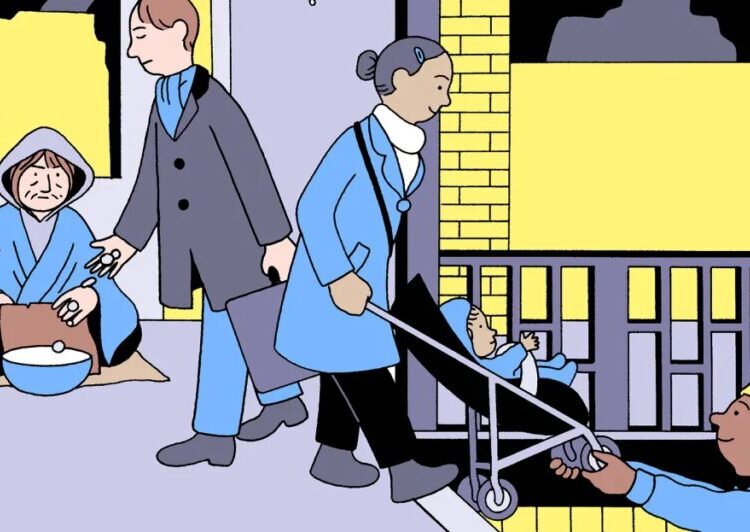Dan Kluver saw the police lights flashing in his rearview mirror late last year and eased his car onto the shoulder, thinking there had been some kind of mistake. He had spent four decades in rural Minnesota without ever getting into trouble. He prided himself on a life built around dependability and routine, working at the same factory where his father once did and spending his weekends coaching baseball and teaching Sunday school. He had never fired a gun, or smoked a cigarette, or missed a payment, or been arrested.
“License and registration, please,” the officer said. Kluver, 42, handed them over and waited while the officer went back to his patrol car. He listened to the church bells that rang every hour and watched sunlight reflect off the grain silos in downtown Olivia, where he knew most of the 2,400 residents, including the officer who was walking back to his car.
“Is everything all right?” Kluver asked.
“It’s strange, but it looks like your license has been suspended,” the officer said. “You’ve got another driver’s license with some issues down in Missouri.”
“What?” Kluver said. “I’ve barely ever been to Missouri. How’s that possible?”
The officer had no answers, but Kluver feared he might know what was happening. Over the years, there had been signs that something wasn’t right — stray letters about wages earned in unfamiliar towns and collection notices for debt that wasn’t his. Kluver had tried to untangle the mess several times by hiring tax specialists and driving to government offices across the state only to run into the same bureaucratic dead ends. But now the problem was bigger than unpaid taxes. Someone was impersonating him, moving through the world as Dan Kluver, building a life in his name with a government-issued ID.
His case was one version of a problem that’s been spreading across the country for years. The government estimates that as many as one million undocumented workers are using fraudulent or stolen Social Security numbers — a survival tactic used to pass background checks and get jobs. The numbers are skimmed from data breaches, sold in black markets online for as little as $150 or handed out in border towns by human smugglers. Many numbers connect back to U.S. citizen children, dead people or Puerto Ricans whose numbers circulate easily across the mainland. But thousands of others belong to people like Kluver, Americans whose names and identities are no longer theirs alone.
The police officer sent Kluver home with a warning, and he sifted through file cabinets with his wife, Kristy, searching for clues about the other Dan Kluver. His Social Security card was safely locked away alongside the birth certificates for their three children. He’d never been robbed or even lost his wallet, but there was his number, printed on a W-2 from a leather factory in a town he’d never visited. He traced 15 years of records and found more tax documents listing unfamiliar jobs, at a cement plant in Kansas, a paper mill in Tennessee, a construction company in Ohio, a cereal factory in Nebraska and a dog food plant in Missouri.
“How do they think you’re getting between all these places?” Kristy asked. “It’s eerie.”
“It’s like I’ve lost all control over who I am,” Kluver said.
Some years the other Dan Kluver had earned more than his own salary at a local sugar beet factory, which pushed the total income under his Social Security number into a higher tax bracket as the debt started to mount. Twice, he’d contacted law enforcement and filed an identity theft report with the federal government, where it landed in a pile along with tens of thousands of similar reports filed each year. He waited for relief while the I.R.S. docked his annual tax returns and garnished a few of his paychecks, costing him thousands. Finally, a few months before their wedding in 2012, Kristy decided to pay off the balance, emptying her savings and sending in a check for $6,000. Their relief lasted until the next tax season, when a new bill arrived — this one for $22,000.
They spent the next decade living with the consequences — annual tax audits, budgets that never added up, whispered arguments after the kids went to bed. Kluver kept calling government numbers and waiting on hold until he eventually resigned himself to a payment plan. He agreed to send the I.R.S. $150 each month, which he’d done more than 35 times. “I can’t keep obsessing over this and getting nowhere,” he told Kristy. “I need to think about something else.”
He kept his radio at the factory tuned to sports talk, but lately it was interrupted by news segments about immigration raids and border lockdowns. President Trump was promoting Operation Take Back America, a nationwide campaign to root out undocumented workers using fake IDs. Kluver, a registered Republican, rarely paid attention to politics, but he began to wonder if his case might finally be a priority, and if he could reclaim what belonged to him.
A few weeks after he was pulled over, he drove to the police station in Olivia to submit another affidavit for identity theft.
“Someone has stolen my ID for working purposes,” he wrote. “It’s been happening for 15 years. There’s another me out there. Can we find him?”
He had lived under enough names and numbers in the United States that they started to blur together. Vincent Trujillo. Reynaldo Guerra. And then, for more than a decade, Daniel Kluver — the name he used until he could barely remember what it felt like to exist as himself: Romeo Pérez-Bravo, 42, a Guatemalan immigrant who had spent most of his adult life working under borrowed identities.
By the start of 2025, he was preparing for another graveyard shift in St. Joseph, Mo., lacing his work boots in the darkness of his drafty rental while his wife and five children slept. He packed their school lunches for the next day, drove to the dog-food factory and gathered with his co-workers to say their nightly prayer. Then he swiped his badge to begin another 12-hour shift as Daniel Kluver, sinking deeper into an identity that wasn’t really his own.
“Daniel?” his boss always shouted, taking attendance before they went out to their lines.
“Here,” he said.
Perez-Bravo had come to the United States for the first time at 16 to help earn money for his family, traveling alone to join his father in Marshall, Minn. He hiked out of the Guatemalan highlands, rode atop a freight train for three weeks across Mexico, nearly drowned in the Rio Grande and took a Greyhound to Middle America, where life somehow felt harder. He slept on a couch in his father’s apartment and enrolled in high school despite speaking almost no English. Then he began to look for a job, but no one would hire an underage worker without papers.
Eventually, a turkey-processing company offered him a position if he could provide an ID to satisfy the government-required I-9 form. A friend who worked at the factory introduced Perez-Bravo to someone who sold sets of names, IDs and Social Security numbers for as little as $250. Perez-Bravo thought the documents looked flimsy and fake, but his friends assured him that at least half of the company’s workers were using similar IDs. He needed a job, and the turkey plant needed workers. Nobody looked too hard at his paperwork, and soon he was making $7 an hour on the graveyard shift, cutting turkeys at night and going to school in the morning.
The first years were lonely and exhausting. He started to drink, which led to a string of D.U.I.s and other minor offenses. He was deported back to Guatemala in 2005, 2008 and 2009, but each time he returned to the United States and purchased a new ID for work. Some of the Social Security numbers were connected to child support or other debts, which meant his paychecks were garnished. Others were flagged as suspicious by H.R. departments. He sought out new documents from the black market, sending a few text messages and then meeting a middle man on a street corner in Nebraska to pay in cash. This time the Social Security card was for Daniel Kluver. Perez-Bravo didn’t know if that person was fake, or dead, or a victim of identity theft, or somehow in on the scheme. But the number worked at a succession of factory jobs across the Midwest.
Like millions of undocumented immigrants, he paid federal and state taxes that were automatically deducted from his paycheck. To Perez-Bravo, that meant he was contributing thousands into a Social Security fund from which he would never collect. But to the I.R.S., it looked like one Daniel Kluver was working several jobs, making more than $130,000 and paying a tax rate for someone living just above the poverty line.
The debts accumulated in Olivia, Minn., but the paychecks kept coming in St. Joseph, Mo. By the time Trump was elected to his second term, there were five children in Perez-Bravo’s house who also depended on the money that came each Friday in Kluver’s name. Most were U.S. citizens, ranging in age from 4 to 19, who answered his Spanish with English and hosted birthday parties at Olive Garden.
Perez-Bravo wanted to live and work under his own name, so he signed up for extra shifts and stacked overtime until he could afford to hire an immigration lawyer earlier this year. He paid $4,000 upfront only to learn that the pathways to citizenship were essentially closed under the Trump administration for someone with a history of D.U.I.s and deportations, even if he’d stopped drinking and kept his record clean for the past 15 years.
“All I do is take care of my family and go to work,” he told his lawyer. “Is there no way to fix this?”
“The situation right now is very complicated,” the lawyer said.
His brother-in-law had already been pulled over on his way to work and detained as part of Operation Take Back America. Three other Guatemalan families had disappeared from church. The governor had ordered the local police to assist ICE in making arrests, and Missouri was turning some of its county jails into immigrant detention centers.
A group of far-right activists in St. Joseph had organized a tip line where people could report neighbors who they suspected were in the country illegally. Perez-Bravo called them “the hunters,” and increasingly he felt like prey, living close to the ground. He stopped going for evening walks to the park with his 4-year-old son. He drove back roads into work. He turned down promotions that would have required extra paperwork and then cashed his paychecks each Friday rather than risking the record of a bank account.
He spent four nights each week at an immigrant church on the outskirts of downtown. It was one of the few places in the United States where he felt safe enough to go by his own name. One of the pastors had started a text messaging group, and each day the congregation shared a new mix of prayers and precautions.
“Stay away from Walmart today,” one person wrote. “I heard about a raid.”
“Lots of activity,” someone else responded. “Everybody OK?”
“I’m home,” Perez-Bravo told the group. “Trying to survive.”
The case of Dan Kluver’s stolen identity landed in the tiny Olivia Police Department, where it was assigned early this year to Officer Damon Coots, a rookie who had never investigated an identity theft or much else. He’d only recently accepted his first policing job in his wife’s hometown, the self-proclaimed Corn Capital of the World. Some nights he was the only officer on duty. He was expected to handle everything from traffic infractions to farming disputes to complex investigations, so he asked Kluver for some paperwork and started digging.
His online searches turned up dozens of results in Kluver’s name in government databases: a string of addresses in St. Joseph, Mo.; car titles; work authorizations; and insurance forms. Within a few weeks, Coots had assembled a full binder of evidence, including a photo of a Missouri driver’s license.
Kluver studied an image of the ID, his own name printed alongside a photo of a stranger — brown eyes, neat goatee, a friendly smile.
“Who is he?” Kluver asked.
“That’s what we’re trying to figure out,” Coots said.
He passed the case along to the St. Joseph Police, who brought in federal agents from the Department of Homeland Security. The detectives started to investigate, updating Kluver every few days as they traced the other Dan Kluver’s routine from his house to his church to his job at the dog-food factory. They learned he was an undocumented immigrant from Guatemala. He worked 60 or 70 hours each week. He was living with a wife and several children and had already been deported three times.
And then came a detail from a police report that Kluver couldn’t shake. In the summer of 2022, the other Dan Kluver had been driving to work in St. Joseph when the serpentine belt broke in his car, causing him to lose control at a red light and collide with a grandfather and his 9-year-old granddaughter as they rode on a motorized tricycle. The girl sustained minor injuries, but the 68-year-old man flew off the bike, broke his pelvis in two places, struck his head and died. The driver stayed on the scene, praying and cooperating with the police as he handed over a license and registration for Dan Kluver. He was cleared of any wrongdoing. The crash was ruled an accident. But the victim’s family had filed a wrongful-death lawsuit — with Kluver listed as the defendant.
“It just keeps getting more unbelievable,” Kluver told Kristy. “I can understand doing whatever you have to do to provide for your kids, but now somebody’s death is attached to my name?”
“And it could be worse,” she said. “What if he was violent? What if he was a terrorist?”
Kristy was a nurse practitioner at a nearby hospital, where she often treated patients whose IDs didn’t match their medical records. Some days, it was part of her job to untangle identities through an interpreter. “I’m so tired of dealing with a broken system,” she said.
At the beet factory, Kluver worked alongside dozens of immigrants from Mexico and Central America who had become his friends. They took the hardest shifts, asked about his family and taught him phrases in Spanish. A wave of migrant workers had helped revitalize small towns throughout rural Minnesota, harvesting crops during a labor shortage, buying up empty homes, opening restaurants and enlivening old churches.
But what bothered him lately was the idea he kept hearing from liberal politicians and even some relatives in Minnesota — that illegal immigration was mostly harmless, a victimless crime. His name was no longer his own. His debts were spiraling. He was still cutting checks to the I.R.S. for $150 each month, and the government said that debt was his to pay until a court determined otherwise. Even if the other Dan Kluver seemed to be a decent man — working, raising a family, going to church — his patience had limits.
“Anything new?” Kluver texted one of the detectives, early this spring. The system was backlogged with a million suspicious numbers and almost 80,000 reports of Social Security fraud in the last six months alone, but his case had finally landed at the top of the pile.
“We are planning on next week to grab him,” the agent said.
“Boom!” Kluver wrote. “Starting to feel some relief.”
He was getting ready for his next 12-hour shift at the dog-food factory in late March when he heard pounding on the front door of his house and felt dread rise in his chest. Through the bedroom window he saw five cars lined up outside and several federal agents waiting beside his children’s bikes and shoes on the front porch. He said a quick prayer, left his children in their rooms and walked downstairs to open the door.
“Daniel Kluver?” one of the officers asked, and he knew it was over. They showed him an arrest warrant in his real name and handcuffed him before leading him out of the house.
He was charged with aggravated identity theft and false representation of a Social Security number and was held in detention for six weeks before an initial bond hearing in April. The State of Missouri argued that he was a flight risk who needed to remain in custody until the trial. “What’s to stop him from going out and getting another identity and just living underneath that,” the prosecutor told the judge. “We’ve seen that before.”
But Perez-Bravo had most of his family and several members of his church at the hearing, and his lawyer said that he was “connected to the city in deep ways.” He regularly cooked for 60 people at church barbecues. He had a son who was about to graduate from high school, a boss who wrote letters testifying to his work ethic, and a pastor who was willing to pay a $1,000 bond on his behalf and risk her house as collateral. “This is a kind family and they help everybody,” the pastor testified. “We’re going to help him.” The judge ruled that he could return home with an ankle monitor until his next court date as long as he stopped using Kluver’s name and Social Security number.
That meant he could no longer work, so he spent his afternoons in a dark living room with Bible quotes printed on the walls, doing puzzles with his 4-year-old while the rest of the family came and went. His wife cleaned houses, his daughter washed linens at a hotel and two of his sons worked in restaurants, but it still wasn’t enough to make up for the lost income in Kluver’s name. Perez-Bravo made tacos by the hundreds and sold them to neighbors. He sold his car and some of his lawn tools to cover rent, losing 25 pounds to stress as he disassembled his life one sale at a time.
His lawyer had advised him that he was essentially out of options. She had managed to postpone his case until at least January 2026, but he faced a mandatory minimum sentence of two years in prison followed by deportation to Guatemala. During the initial court hearings, Perez-Bravo had listened to the prosecution talk about the other Dan Kluver — a loyal employee, a devoted father, a debtor sending monthly payments, a victim of a broken system.
“He sounds like me — a good worker,” Perez-Bravo told his wife, one day last month. “I don’t want to mess things up for anyone. I just want to work. It makes me crazy with no job. How many hours can I sit and pray?”
“You’re still here,” she told him. “That’s what matters.”
“I’m here and I’m worthless,” he said. “This is not a life.”
He got up and walked to the front porch. Lately, most of his relatives were too afraid to go outside, but Perez-Bravo had already been arrested and he needed the air. He went to get the mail with his 4-year-old trailing behind, never more than a few feet away since the arrest.
He found two envelopes — one an old pay stub addressed to Daniel Kluver, the other a court notice for Romeo Perez-Bravo. He grabbed them both, two names tied to one number, and then followed his son back into the house.
Audio produced Tally Abecassis.
Eli Saslow writes in-depth stories about the impact of major national issues on people’s lives.
The post Two Men. One Identity. They Both Paid the Price. appeared first on New York Times.




